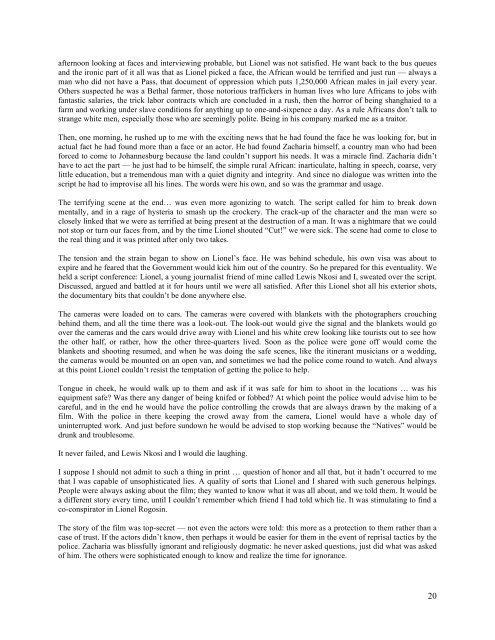Come Back Africa Press Kit - Get a Free Blog
Come Back Africa Press Kit - Get a Free Blog
Come Back Africa Press Kit - Get a Free Blog
You also want an ePaper? Increase the reach of your titles
YUMPU automatically turns print PDFs into web optimized ePapers that Google loves.
afternoon looking at faces and interviewing probable, but Lionel was not satisfied. He want back to the bus queues<br />
and the ironic part of it all was that as Lionel picked a face, the <strong>Africa</strong>n would be terrified and just run — always a<br />
man who did not have a Pass, that document of oppression which puts 1,250,000 <strong>Africa</strong>n males in jail every year.<br />
Others suspected he was a Bethal farmer, those notorious traffickers in human lives who lure <strong>Africa</strong>ns to jobs with<br />
fantastic salaries, the trick labor contracts which are concluded in a rush, then the horror of being shanghaied to a<br />
farm and working under slave conditions for anything up to one-and-sixpence a day. As a rule <strong>Africa</strong>ns don’t talk to<br />
strange white men, especially those who are seemingly polite. Being in his company marked me as a traitor.<br />
Then, one morning, he rushed up to me with the exciting news that he had found the face he was looking for, but in<br />
actual fact he had found more than a face or an actor. He had found Zacharia himself, a country man who had been<br />
forced to come to Johannesburg because the land couldn’t support his needs. It was a miracle find. Zacharia didn’t<br />
have to act the part — he just had to be himself, the simple rural <strong>Africa</strong>n: inarticulate, halting in speech, coarse, very<br />
little education, but a tremendous man with a quiet dignity and integrity. And since no dialogue was written into the<br />
script he had to improvise all his lines. The words were his own, and so was the grammar and usage.<br />
The terrifying scene at the end… was even more agonizing to watch. The script called for him to break down<br />
mentally, and in a rage of hysteria to smash up the crockery. The crack-up of the character and the man were so<br />
closely linked that we were as terrified at being present at the destruction of a man. It was a nightmare that we could<br />
not stop or turn our faces from, and by the time Lionel shouted “Cut!” we were sick. The scene had come to close to<br />
the real thing and it was printed after only two takes.<br />
The tension and the strain began to show on Lionel’s face. He was behind schedule, his own visa was about to<br />
expire and he feared that the Government would kick him out of the country. So he prepared for this eventuality. We<br />
held a script conference: Lionel, a young journalist friend of mine called Lewis Nkosi and I, sweated over the script.<br />
Discussed, argued and battled at it for hours until we were all satisfied. After this Lionel shot all his exterior shots,<br />
the documentary bits that couldn’t be done anywhere else.<br />
The cameras were loaded on to cars. The cameras were covered with blankets with the photographers crouching<br />
behind them, and all the time there was a look-out. The look-out would give the signal and the blankets would go<br />
over the cameras and the cars would drive away with Lionel and his white crew looking like tourists out to see how<br />
the other half, or rather, how the other three-quarters lived. Soon as the police were gone off would come the<br />
blankets and shooting resumed, and when he was doing the safe scenes, like the itinerant musicians or a wedding,<br />
the cameras would be mounted on an open van, and sometimes we had the police come round to watch. And always<br />
at this point Lionel couldn’t resist the temptation of getting the police to help.<br />
Tongue in cheek, he would walk up to them and ask if it was safe for him to shoot in the locations … was his<br />
equipment safe? Was there any danger of being knifed or fobbed? At which point the police would advise him to be<br />
careful, and in the end he would have the police controlling the crowds that are always drawn by the making of a<br />
film. With the police in there keeping the crowd away from the camera, Lionel would have a whole day of<br />
uninterrupted work. And just before sundown he would be advised to stop working because the “Natives” would be<br />
drunk and troublesome.<br />
It never failed, and Lewis Nkosi and I would die laughing.<br />
I suppose I should not admit to such a thing in print … question of honor and all that, but it hadn’t occurred to me<br />
that I was capable of unsophisticated lies. A quality of sorts that Lionel and I shared with such generous helpings.<br />
People were always asking about the film; they wanted to know what it was all about, and we told them. It would be<br />
a different story every time, until I couldn’t remember which friend I had told which lie. It was stimulating to find a<br />
co-conspirator in Lionel Rogosin.<br />
The story of the film was top-secret — not even the actors were told: this more as a protection to them rather than a<br />
case of trust. If the actors didn’t know, then perhaps it would be easier for them in the event of reprisal tactics by the<br />
police. Zacharia was blissfully ignorant and religiously dogmatic: he never asked questions, just did what was asked<br />
of him. The others were sophisticated enough to know and realize the time for ignorance.<br />
20


